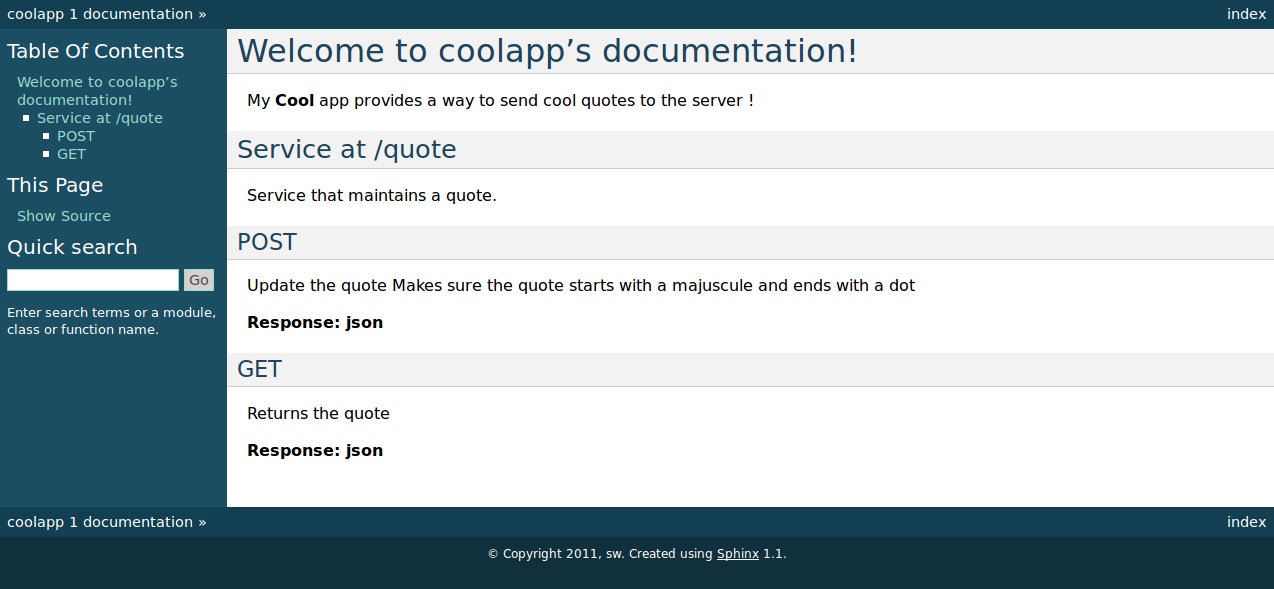Cornice extension to generate Sphinx doc
Maintaining documentation while the code is evolving is painful. Avoiding information duplication is also quite a challenge.
Cornice tries to reduce a bit the pain by providing a Sphinx (http://sphinx.pocoo.org/) directive that scans the web services and build the documentation using:
- the description provided when a Service instance is created
- the docstrings of all functions involved in creating the response: the web services function itself and the validators.
The assumption made is that maintaining those docstrings while working on the code is easier.
To activate Cornice's directive, you must include it in your Sphinx project :file:`conf.py` file:
import cornice sys.path.insert(0, os.path.abspath(cornice.__file__)) extensions = ['cornice_sphinx']
Of course this may vary if you have other extensions.
Cornice provides a cornice-autodoc directive you can use to inject the Web Services documentation into Sphinx.
The directive has the following options:
modules: a comma-separated list of the python modules that contain Cornice Web services. Cornice will scan it and look for the services.
app: set the path to you app needed for imperative registering services.
services: a comma-separated list of services, as you named them when using the cornice Service directive. optional
service: if you have only one name, then you can use service rather than services. optional
ignore: a comma separated list of services names to ignore. optional
docstring-replace: replace certain words in docstring. optional
module or app are mandatory
You can use info fields (see Info field lists) in your functions, methods and validators.
Note
This directive used to be named "services" and had been renamed for something more consistant with the Sphinx ecosystem.
Let's say you have a quote project with a single service where you can POST and GET a quote.
The service makes sure the quote starts with a majuscule and ends with a dot !
Here's the full declarative app:
from cornice import Service
from pyramid.config import Configurator
import string
desc = """\
Service that maintains a quote.
"""
quote = Service(name='quote', path='/quote', description=desc)
def check_quote(request):
"""Makes sure the quote starts with a majuscule and ends with a dot"""
quote = request.body
if quote[0] not in string.ascii_uppercase:
request.errors.add('body', 'quote', 'Does not start with a majuscule')
if quote[-1] not in ('.', '?', '!'):
request.errors.add('body', 'quote', 'Does not end properly')
if len(request.errors) == 0:
request.validated['quote'] = quote
_quote = {}
_quote['default'] = "Not set, yet !"
@quote.get()
def get_quote(request):
"""Returns the quote"""
return _quote['default']
@quote.post(validators=check_quote)
def post_quote(request):
"""Update the quote"""
_quote['default'] = request.validated['quote']
def main(global_config, **settings):
config = Configurator(settings={})
config.include("cornice")
config.scan("coolapp")
return config.make_wsgi_app()
if __name__ == '__main__':
from wsgiref.simple_server import make_server
app = main({})
httpd = make_server('', 6543, app)
print("Listening on port 6543....")
httpd.serve_forever()
And here's the full Sphinx doc example:
Welcome to coolapp's documentation! =================================== My **Cool** app provides a way to send cool quotes to the server ! .. cornice-autodoc:: :modules: coolapp :service: quote
Here's the full imperative app:
from cornice import Service
from pyramid.config import Configurator
import string
def check_quote(request):
"""Makes sure the quote starts with a majuscule and ends with a dot"""
quote = request.body
if quote[0] not in string.ascii_uppercase:
request.errors.add('body', 'quote', 'Does not start with a majuscule')
if quote[-1] not in ('.', '?', '!'):
request.errors.add('body', 'quote', 'Does not end properly')
if len(request.errors) == 0:
request.validated['quote'] = quote
_quote = {}
_quote['default'] = "Not set, yet !"
def get_quote(request):
"""Returns the quote"""
return _quote['default']
def post_quote(request):
"""Update the quote"""
_quote['default'] = request.validated['quote']
def main(global_config, **settings):
config = Configurator(settings={})
config.include("cornice")
desc = "Service that maintains a quote."
quote = Service(name='quote', path='/quote', description=desc)
quote.add_view("GET", get_quote)
quote.add_view("POST", post_quote, validators=check_quote)
config.add_cornice_service(quote)
return config.make_wsgi_app()
if __name__ == '__main__':
from wsgiref.simple_server import make_server
app = main({})
httpd = make_server('', 6543, app)
print("Listening on port 6543....")
httpd.serve_forever()
Client calls:
$ curl -X POST http://localhost:6543/quote -d Hansolohat. null $ curl -X GET http://localhost:6543/quote "Hansolohat."
And here's the full Sphinx doc example:
Welcome to coolapp's documentation! =================================== My **Cool** app provides a way to send cool quotes to the server ! .. cornice-autodoc:: :app: coolapp :service: quote
The resulting doc is:
